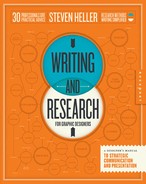
(Ray)
(Fogra 29_WF)Job:08-28858 Title:RP-Writing & Research for Graphic Designers
#175 Dtp:225 Page:84
056-091_28858.indd 84 8/30/12 4:44 PM
(Ray)
(Fogra 29_WF)Job:08-28858 Title:RP-Writing & Research for Graphic Designers
#175 Dtp:225 Page:85
056-091_28858.indd 85 8/30/12 4:44 PM
Writing & research for graphic designers
(Text)
84
now ready to go to Turkey when I get back from China. I’ve
worked with tons of gifted Korean students, folks from Saudi
Arabia, Israel, Russia, Japan, Spain, Indonesia, Cambodia,
and even a few countries I had to sheepishly Google.
If you’ve never taught, I say go for it. Teaching keeps you
young, exposes you to cultural references that you may never
know about otherwise, and students are always up on the
best websites and music. You’ll look smarter in front of your
own kids, nieces, or nephews. And you’ll know who someone
named Florence and the Machine is.
1 Zipeng Zhu, from my 2011–2012
Communication in Graphic Design
third year class.
2 ABC’s of a Sassy Little Asian Girl
by Jessie Gang
3 The ABC’s of Chinglish
by Zipeng Zhu
4 The ABC’s of Drug Slang
by Melanie Chernock
5 The ABC’s of Awkward Situations
by Sandra Woodruff
1
4
2 3
5
(Ray)
(Fogra 29_WF)Job:08-28858 Title:RP-Writing & Research for Graphic Designers
09-C67944 #175 Dtp:225 Page:84
056-091_C67944.indd 84 9/22/12 11:25 AM
section 2
surveying the diciplines
(Text)
85
CASE STUDY:
“thank you,” or Why socrates Was Wrong
LIz DAnzICO
Liz Danzico is the chair of MFA Interaction Design at the School of Visual Arts, New York.
(Originally published October 19, 2009 on Bobulate, http://bobulate.com/post/205253518/on-thank-you-or-why-socrates-was-wrong)
“When you’ve received a present (referring to my new tennis
racket), you must follow up by saying thanks with a card or
a letter,” she instructed. “It’s good manners.” So there I was.
Torn between manners and a racket. Upon arriving home, she
introduced me to Emily Post.
While the merits of Emily Post are much contested, the
sentiment had the right intention. The formula is quite
simple: when someone does something for you, say thank you.
It was an invaluable piece of advice that I’ve followed in
my adult life, writing thank you notes for all things—big,
small, monumental, and frivolous. And always within 48 hours
of the happening. All very personal. Never a Hallmark.
Never a pre-printed affair. Never the same twice. Always
something I have to dash off myself.
But there is some finesse to writing the thank you. Or at
least a handful of things to keep in mind. Here are my guide-
lines to writing the critical note:
Thank you notes are tangible notes whenever possible.
These notes are all done by hand whenever possible, sent
via USPS mail. A follow-up-thank-you (a thank-you for a
gesture on a second occasion) may be done via email, SMS,
DM, Facebook, or whatever your choice of media; regardless,
the text should be composed with care.
Thank you notes need not be “notes.”
As she drove us home in the blue Fiat that first week of fourth
grade, my mother began by announcing that it was time for me
to begin writing thank you notes.
Write your thank you notes on other objects. Second to
notes, I send thank-you books quite often, writing the note
of gratitude inside. Thank-you videos are time-intensive, but
family members receive them. Newsprint, photos, negatives.
There are choices.
You want busy people to read your thank you note too.
Thus, keep it short; do not restate the obvious; and give busy
people something of value to read. Personal contacts and good
information they aren’t aware of count as value. Don’t ask busy
people for more. (And, of course, under no circumstances, ever,
should you write out a URL by hand in a thank you note.)
Set up a thank-you framework.
The biggest obstacle to thanking is sometimes the tools. Phone,
email, letter, SMS—options get in the way. Do yourself a favor
and set up a thank-you framework. Get some cards, stamps, or
even an email template. Do not send one-word emails of “thanks.”
Thanks.
Much later on than fourth grade, I was quite troubled to
read Socrates urging that “writing destroys memory.” His
intention, of course, was that those who use writing will
become forgetful, relying on external resources for what they
lack. I think these written transcriptions over a past event
don’t destroy memory, but might, in fact, preserve it. Clearly,
Socrates had just never received a thank you note.
pArT seven : BloG
(Ray)
(Fogra 29_WF)Job:08-28858 Title:RP-Writing & Research for Graphic Designers
09-C67944 #175 Dtp:225 Page:85
056-091_C67944.indd 85 9/22/12 11:25 AM
..................Content has been hidden....................
You can't read the all page of ebook, please click here login for view all page.
